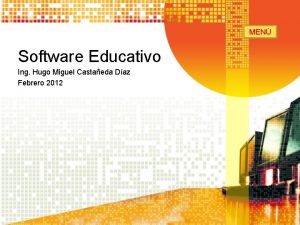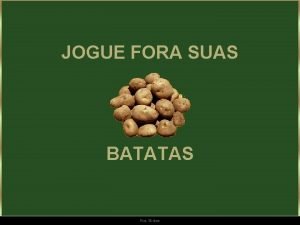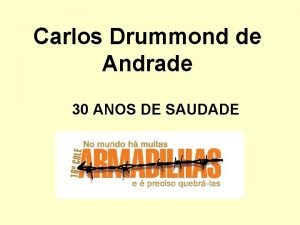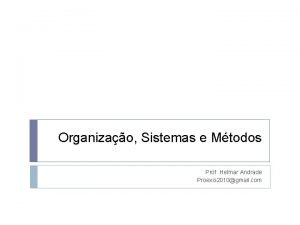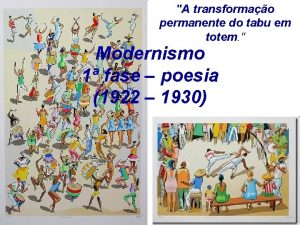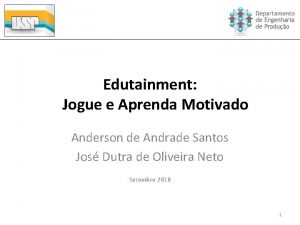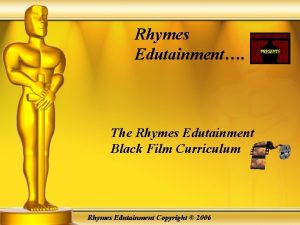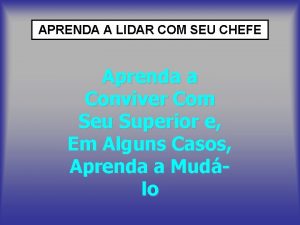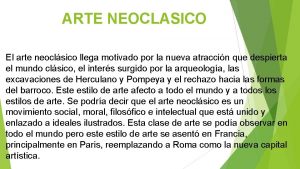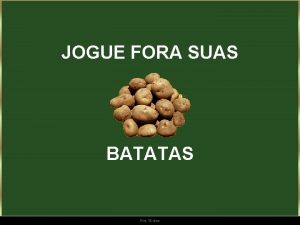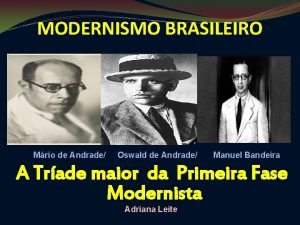Edutainment Jogue e Aprenda Motivado Anderson de Andrade















- Slides: 15

Edutainment: Jogue e Aprenda Motivado Anderson de Andrade Santos José Dutra de Oliveira Neto Setembro 2010 1

Sumário • Introdução • Jogos em ambientes virtuais de aprendizagem • Teoria Motivacional e Teoria da Carga Cognitiva • Material e métodos • Resultados esperados 2

Introdução 67% , em Federais; o 64, 3%, em Estaduais; t n e m i esc r c e d 8 0 0 Taxa 2 m 61, 2%, em Municipais, e e % 9 , 6 de 9 55, 3%, em privadas. 3

Introdução Objetivo deste trabalho é avaliar como o processo motivacional e o cognitivo são afetados por um jogo Teoria da Carga Motivacional Desmotivação Cognitiva 4

Jogos em ambientes virtuais de aprendizagem • Desafiadores • Voluntários • Divertidos • Lúdicos • Desenvolvidos com recursos midiáticos • Baseados em teorias 5

6

Teoria motivacional John M. Keller: Modelo ARCS Satisfação Atenção Segurança Relevância 7

Teoria da carga cognitiva Richard E. Mayer Natural Intrínseca Externa 8

Material e métodos • Local • Quantidade • Orientação TIPO DE PESQUISA • Quantitativa • Levantamento AMOSTRA 9

Resultados Esperados Teoria Motivacional Teoria da Carga Cognitiva 10

Obrigado pela atenção. Contatos: Anderson Andrade: anderson. andrade@fecap. br José Dutra: dutra@usp. br 11

Referências Bibliográficas ANG, C. , S. ; ZAPHIRIS, P. ; MAHMOOD, S. A model of cognitive loads in massively multiplayer online role playing games. Interacting with Computers, v. 19 (2), pp. 167179, set. 2007. CHENG, Y. C. ; Yeh, H. T. From concepts of motivation to its application in instructional design: Reconsidering motivation from an instructional design perspective, British Journal of Educational Technology, v. 40, n. 4, pp. 597– 605, jun. 2009. FILHO, R. L. L. S; MOTEJUNAS, P. R; HIPOLITO, O. ; LOBO, M. B. C. M. A evasão no ensino superior brasileiro, Cadernos de Pesquisa, v. 37, n. 132, pp. 641 -659, set /dez. 2007. GREDLER, M. Designing and evaluating games and simulations, Houston: Gulf, 1994. GOLLWITZER, P. M. Implementation Intentions: strong effects of simple plans. American Psychologist, v. 54, n. 7, pp. 493 -503, jul. 1999. HUANG, W; HUANG, W. Y. ; DIEFES-DUX, H. e IMBRIE, P. K. A preliminary validation of attention, relevance, confidence, and satisfaction model-based instructional material motivational survey in a computer-based tutorial setting. British Journal of Educational Technology, v. 37, pp. 243 -259, mar. 2006. INEP. Ministério da Educação e Cultura- MEC. Censo da Educação Superior 2008, Brasília, pp. 1 -55, set. 2009. 12

Referências Bibliográficas KELLER, J. M. Motivational design of instruction. In C. M. Reigeluth (Ed. ), Instructional design theories and models: an overview of their current status. Hillsdale, NJ: Lawrence Erlbaum Associates, 1983. ____. Strategies for stimulating the motivation to learn. Performance and Instruction, v. 26, pp. 1– 7, out. 1987. ____. Motivation by design. Unpublished manuscript, Florida State University, Florida. 1993. ____. First principles of motivation to learn and e (3)-learning. Distance Education, v. 29, pp. 175 -185, ago. 2008. KUHL, J. Action control: the maintenance of motivational states. In F. Halisch & J. Kuhl (Eds. ), Motivation, intention and volition, Berlin: Springer pp. 279– 291 1987 LIN, C. ; JUAN. L. Applying motivational analysis in a web-based course. Innovations in Education and training International, v. 46, pp. 91 -103, fev. 2009. MAYER, Richard. Multimedia Learning. Cambridge: Cambridge University Press. 2001. MAYER, R. E. ; MORENO, R. Nine ways to reduce cognitive load in multimedia Learning. Educational Psychologist, v. 38 n. 1, pp. 43– 52. Mar. 2003 13

Referências Bibliográficas MOOS, D. C. ; MARROQUIN, E. Multimedia, hypermedia, and hypertext: Motivation considered and reconsidered. Computers in Human Behavior, v. 26, p. 265 -279, maio 2010. NELSON, B. ; ERLANDSON, B. Managing cognitive load in educational multi-user virtual environments: Reflection on design practice, Educational Technology Research and Development, v. 56, pp. 619– 641, dez. 2008. ORR, K e MCGUINNESS, C. 3 D Games-Based Learning Environments in Northern Ireland Classrooms: What do the Teachers and Pupils Think of This Technology? . In: 2 nd European Conference on Games Based Learning, Univ Oberta Catalunya, Barcelona, Espanha, oct. pp. 16 -17, 2008. PANNESE, L. ; CARLESI, M. Games and learning come together to maximize effectiveness: The challenge of bridging the gap, British Journal of Educational Technology, v. 38(3), pp. 438 -454, maio 2007. PEREZ, P. R. A. ; PEREZ, L. C. ; AFONSO; M. C. G. ; BENITEZ; J. T. B. Causas del abandono y prolongación de los estudios universitarios. Paradìgma, v. 27, n. 1, p. 349 -363. jan. 2006. UNESCO. Relatório de monitoramento de educação para todos Brasil 2008, Brasília, pp. 1 -66, jan. 2008. 14

Referências Bibliográficas _______. Estudio sobre la repitencia y deserción en la educación superior chilena, Caracas, IESALC, P. 1 -55, abr. 2005. ZIMMERMAN, B. J. ; e MARTINEZ, P, M. Development of a structured interview for assessing student use of self-regulated learning strategies. American Educational Research Journal, v. 23, pp. 614 -628, jan. 1986. 15
 Moodle itq
Moodle itq El kernicterus es un síndrome motivado por
El kernicterus es un síndrome motivado por Burros
Burros Como se manter motivado no trabalho
Como se manter motivado no trabalho Quando tudo for pedra jogue a primeira flor musica
Quando tudo for pedra jogue a primeira flor musica Quando tudo for pedra, atire a primeira flor!
Quando tudo for pedra, atire a primeira flor! Jogue fora suas batatas
Jogue fora suas batatas Territorio teen
Territorio teen Aprenda a amar a todos indistintamente livro
Aprenda a amar a todos indistintamente livro Aprenda los signos reaccione pronto
Aprenda los signos reaccione pronto Aprenda a separar as coisas
Aprenda a separar as coisas Aprenda a depender de deus
Aprenda a depender de deus Aprenda a caminhar sozinho
Aprenda a caminhar sozinho Saudade carlos drummond de andrade
Saudade carlos drummond de andrade Simbologia fluxograma
Simbologia fluxograma O amor oswald de andrade
O amor oswald de andrade
